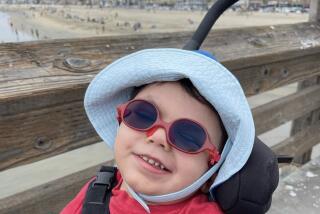Jahi McMath, girl declared brain dead three years ago, might still be technically alive, judge says
- Share via
Reporting from San Francisco — A California judge has ruled that a teenage girl declared brain-dead more than three years ago after a tonsillectomy may still be technically alive, allowing a malpractice lawsuit against the hospital to proceed.
Alameda County Judge Stephen Pulido ruled Tuesday that it’s up to a jury to determine whether Jahi McMath is alive, which would increase the amount of damages if jurors decide in the family’s favor.
The family is seeking damages from Children’s Hospital in Oakland for allegedly botching a routine operation to remove the girl’s tonsils in December 2013. The family is also demanding a ruling that Jahi is alive and for the hospital to pay for her future care. She was 13 when the operation was conducted.
Jahi, who has been on life support since the procedure, was pronounced dead after the surgery, and the Alameda County coroner signed a death certificate in January 2014.
Lawyers for the girl and her family did not return messages left Thursday seeking comment. A lawyer for the hospital, Thomas Still, had no immediate comment Wednesday morning but said he would comment later.
The case has been at the center of national debate over brain death since the girl’s mother refused to remove her daughter from life support after doctors declared her dead.
Her mother has previously acknowledged that her daughter’s brain is severely and irreparably damaged. But Latasha Spears Winkfield said that her daughter is still alive and that her Christian belief compels her fight to keep her daughter on life support.
Winkfield has released video clips of Jahi’s fingers twitching.
Several doctors, including two hired by an Alameda County court, have said brain-dead patients can still twitch and move slightly.
After a judge ruled that California doctors could remove the girl from life support, her mother took Jahi to New Jersey, the only U.S. state that accommodates religions that do not recognize brain death. She is on life support in a New Jersey apartment, where she receives medical care.
Court records show that New Jersey Medicaid has picked up some of the girl’s healthcare costs. The family has also received financial contributions from an online fundraising campaign.
In ordering the case to trial, Pulido relied on the testimony of a well-known critic of diagnosing brain death, Dr. Alan Shewmon.
In court documents filed in July, the retired UCLA neurologist said videos recorded by Jahi’s family from 2014 to 2016 showed the teen was still alive.
The images, some made public by the girl’s relatives, show Jahi twitching her fingers and reacting to odors that Shewmon and her relatives said were noxious without providing more specifics. Shewmon said Jahi’s body has not deteriorated as expected.
A doctor who examines the girl every three months for the family has testified that Jahi reached puberty and menstruated while in New Jersey.
Shewmon said Jahi is in a “minimally responsive state.”
Hospital lawyers have argued that the family has not subjected Jahi to tests accepted by the American Medical Assn. to determine whether someone is brain-dead.
ALSO
Charlie Gard, child at center of court battle over his end-of-life treatment, dies in London
An 8-year-old was taken off life support, his organs donated. Now, police are investigating
After court rules against parents, toddler is taken off life support
More to Read
Sign up for Essential California
The most important California stories and recommendations in your inbox every morning.
You may occasionally receive promotional content from the Los Angeles Times.








